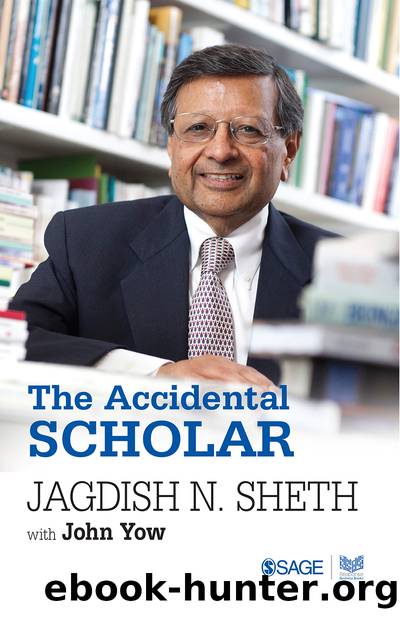The Accidental Scholar by Sheth Jagdish N.;Yow John;

Author:Sheth, Jagdish N.;Yow, John;
Language: eng
Format: epub
ISBN: 978-93-515-0173-2
Publisher: SAGE Publications India Pvt, Ltd.
Published: 2014-11-20T00:00:00+00:00
One of the great lessons of an unpredictable journey is to be flexible. Like for-profit entrepreneurs, academic entrepreneurs must be flexible. What you think will work may not and many things may not work out the way you expect. When opportunity knocks, answer the door.
9
USC CTM AND ATLANTA
When the Bell system break-up was announced in 1982, I was doing some work for one of the already-deregulated consumer electronics division of AT&Tâa maker of handsets. The head of the division at that time was Randall Tobias, a vice chairman of AT&T who was about to become chairman. There were already about 1,800 retail phone centers, and I was teaching a three-day program to Tobiasâs managers about consumers who come to shopping centers to buy phones. As soon as the announcement came, I went to Tobiasâs office and said, âRandy, we need a separate center for understanding the competitive future of the telecom industry. Having already been on the deregulated side of the business, he fully understood that the focus was going to need to shift to customers and competition. He gave me his blessing: âGo and start your center and I will help you.â
Since my move to California was already set in stone, I could not launch the project at Illinois. However, as soon as I arrived at USC in the fall of 1984, I went to Jack Steele and began to explain to him that we had a great opportunity. I would create a Center for Telecommunications Marketing, housed in our Marketing Department. Tobias and I agreed that the teaching and learning of marketing was the key, because the regulated industry had never had to market. I told Steele I would get the telephone companies to fund it, especially AT&T.
The break-up took place in 1984 and suddenly we had seven Baby Bells not talking to each otherâeach playing its own game. Worse yet, separation from AT&T ended like a bitter divorce. Each Bell was looking for an outside perspective on customers and competition. In 1983, right after I accepted the USC job, I got a call from one of the Baby Bells in the Midwest, now called Ameritech, asking me to take a two-year leave of absence to come to Chicago and become an in-house, full-time advisor on how to organize the new company. A precedent had already been set. In 1982, when the announcement came and all the Baby Bells were staring into an uncertain future, one of themâU.S. West, which became Qwestâhired a professor from the Wharton School to come full-time to guide their reorganization. The Baby Bells were all looking for help and I was tempted. Ameritech said that I could stay in Champaign-Urbana and commute to Chicago. But I was already on USCâs payroll. Besides, I worried that if I shifted to industry, I might not ever return to the academic world.
Download
This site does not store any files on its server. We only index and link to content provided by other sites. Please contact the content providers to delete copyright contents if any and email us, we'll remove relevant links or contents immediately.
Hit Refresh by Satya Nadella(9134)
When Breath Becomes Air by Paul Kalanithi(8447)
The Girl Without a Voice by Casey Watson(7889)
A Court of Wings and Ruin by Sarah J. Maas(7847)
Do No Harm Stories of Life, Death and Brain Surgery by Henry Marsh(6941)
Shoe Dog by Phil Knight(5269)
The Rules Do Not Apply by Ariel Levy(4969)
A Higher Loyalty: Truth, Lies, and Leadership by James Comey(4964)
Hunger by Roxane Gay(4928)
Tuesdays with Morrie by Mitch Albom(4784)
Everything Happens for a Reason by Kate Bowler(4743)
The Immortal Life of Henrietta Lacks by Rebecca Skloot(4588)
Millionaire: The Philanderer, Gambler, and Duelist Who Invented Modern Finance by Janet Gleeson(4478)
How to Change Your Mind by Michael Pollan(4357)
All Creatures Great and Small by James Herriot(4322)
The Money Culture by Michael Lewis(4207)
Man and His Symbols by Carl Gustav Jung(4137)
Elon Musk by Ashlee Vance(4127)
Tokyo Vice: An American Reporter on the Police Beat in Japan by Jake Adelstein(3996)
